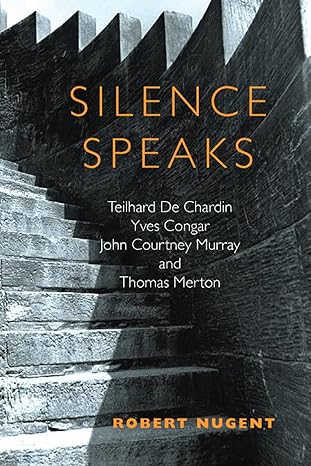 | Silence Speaks: Teilhard de Chardin, Yves Congar, John Courtney Murray, and Thomas Merton by Robert Nugent (Author), Richard Gaillardetz (Introduction) Paulist Press (January 3, 2011). 144 pages. Silence Speaks presents the stories of four internationally recognized 20th-century Catholic theologians and their conflicts with Church authority over their ideas and writings. Each of these men became subject to disciplinary actions that included a prohibition from teaching and writing for various periods of time. Each of them endured critical opposition for their theological insights on ecumenism, war and peace, evolution, the role of laypeople in the Church, and freedom of religion. Despite being “silenced” and suffering internal spiritual crises, each man remained obedient to the Church and ultimately enjoyed at least partial vindication of his views. Readers will find here in one volume a wealth of information gleaned from many sources. |
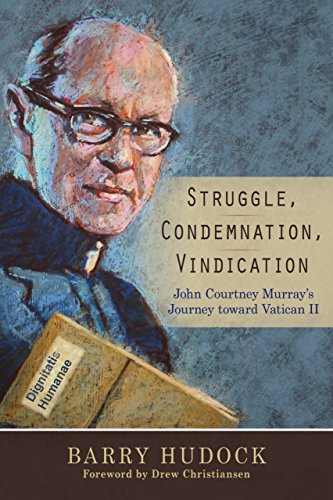 | Struggle, Condemnation, Vindication: John Courtney Murray's Journey toward Vatican II by Barry Hudock Michael Glazier (May 6, 2015). 216 pages. No American Catholic has had greater impact on the doctrinal beliefs of the Roman Catholic Church than Fr. John Courtney Murray, SJ. With almost no power to wield and not much more fame, Murray influenced Catholic doctrine on religious freedom in a dramatic and almost unparalleled way. He did this through his careful scholarship, courage in the face of powerful opposition, and a delicate balance of faithfulness to tradition with theological creativity. In Struggle, Condemnation, Vindication, Barry Hudock tells a true-life theological adventure story, from Murray’s silencing by church authorities to his ultimate vindication at the Second Vatican Council. |
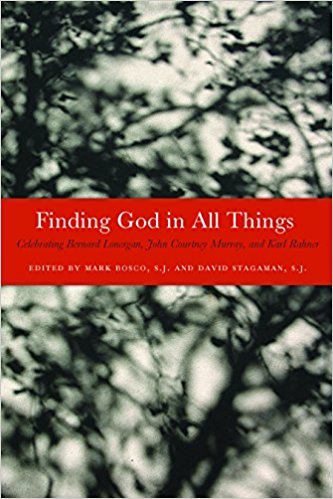 | Finding God in All Things: Celebrating Bernard Lonergan, John Courtney Murray, and Karl Rahner by Mark Bosco S.J. (Editor), David Stagaman S.J. (Editor) Fordham University Press; 1 edition (December 15, 2007). 208 pages. Three of the most influential Catholic theologians of the twentieth century―Bernard Lonergan, John Courtney Murray, and Karl Rahner―were all born in 1904, at the height of the Church’s most militant rhetoric against all things modern. In this culture of suspicion, Lonergan, Murray, and Rahner grew in faith to join the Society of Jesus and struggled with the burden of antimodernist policies in their formation. By the time of their mature work in the 1950s and 1960s, they had helped to redefine the critical dialogue between modern thought and contemporary Catholic theology. After the détente of the Second Vatican Council, they brought Catholic tradition into closer relationship to modern philosophy, history, and politics. Written by leading scholars, friends, and family members, these original essays celebrate the legacies of Lonergan, Murray, and Rahner after a century of theological development. Offering a broad range of perspectives on their lives and works, the essays blend personal and anecdotal accounts with incisive critical appraisals. Together, they offer an accessible introduction to the distinctive character of three great thinkers and how their work shapes the way Catholics think and talk about God, Church, and State. |
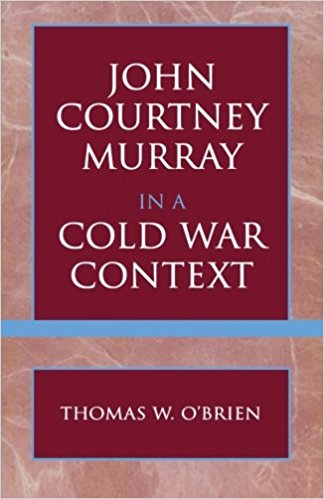 | John Courtney Murray in a Cold War Context by Thomas W. O'Brien UPA (April 30, 2004). 188 pages. This thought-provoking work examines American Catholic theologian John Courtney Murray, whose beliefs featured an enthusiastic endorsement of America and thorough condemnation of communism, in the context of the Cold War debates of the 1950s. This was a time when Catholics were still perceived with suspicion by the mainstream. The book contends that the rhetoric of the Cold War was more than merely an ingredient of John Courtney Murray's public theology―it was part of the very foundation of his thinking. John Courtney Murray in a Cold War Context argues that Murray, and other American Catholics, recognized, through the Cold War milieu, an opportunity to reconcile their religious tradition with their own political affiliation. |
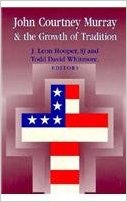 | John Courtney Murray & the Growth of Tradition by Leon J. Hooper (Editor), Todd David Whitmore (Editor) Sheed & Ward (November 1, 1996). 302 pages. John Courtney Murray was the most significant figure in bring together Catholic and American tradition in the 1940s, 50s, and '60s. His work at the Second Vatican Council led to the breakthrough in Catholic doctrine on religious liberty. This volume brings together twelve of the foremost Murray scholars to plumb his work for resources to respond to today's questions. |
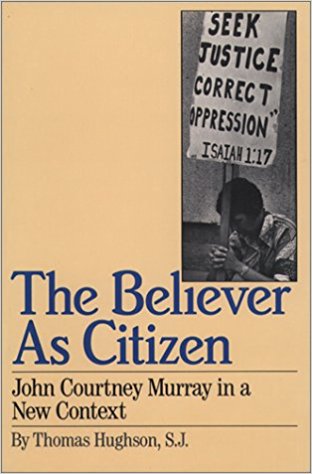 | The Believer as Citizen: John Courtney Murray in a New Context (Studies in Judaism and Christianity) by D. Thomas Hughson Paulist Press; First Edition edition (July 1993). 185 pages. |
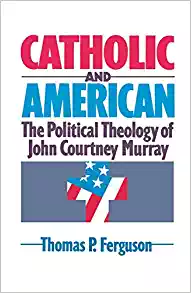 | Catholic and American: The Political Theology of John Courtney Murray by Thomas P. Ferguson Sheed & Ward (July 1, 1993). 189 pages. John Courtney Murray's analysis of the problem of religious liberty included scholarly investigations of both theoretical and practical questions of perennial interest to theologians, Church historians, political theorists, and philosophers. Murray encountered resistance from those who failed to recognize the normative value of religious freedom in the 20th-century. Nonetheless, the Second Vatican Council acknowledged his genius by incorporating many of his ideas in their Declaration on Religious Liberty. In Catholic and American, Thomas Ferguson summarizes the development of Murray's thought. Anyone concerned with the problems of religious freedom in the modern world will appreciate the clarity, thoroughness, and civility of Murray's arguments. |
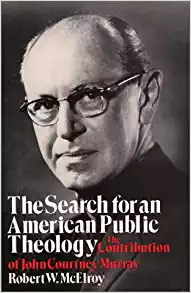 | The Search for an American Public Theology: The Contribution of John Courtney Murray by Robert W. McElroy Paulist Press; 1st edition (May 1989). 216 pages. A synthesis and critical evaluation of Murray's social writings which argues that Murray's life work still represents the best starting point for public theology in the United States of America. |
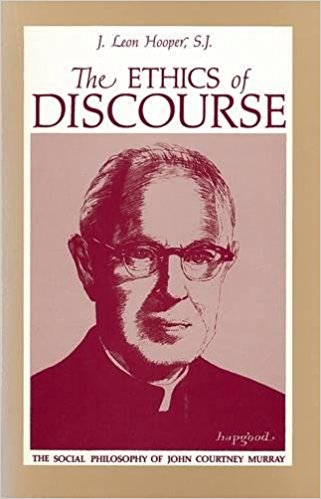 | The Ethics of Discourse: The Social Philosophy of John Courtney Murray by J. Leon Hooper Georgetown University Press (December 1, 1986). 284 pages. The republication of We Hold These Truths is but one indication of the continuing importance of the thought of John Courtney Murray for the Catholic Church in the United States. More than any other American theologian in this century, Fr. Murray developed a new understanding of the healthy relationship between religion and politics, church and state, in a democratic context. Until now, however, the evolution of Murray's own thought in these matters has not been fully understood. Beginning with Murray's first forays into the public arena in the 1940s, Leon Hooper carefully plots Murray's movement away from the classical concepts of conscience and rights toward a more historical understanding of moral agency and of the church's necessary engagement with a pluralistic world. Along the way, Fr. Hooper reveals in detail for the first time the importance of Bernard Lonergan's thought in moving Murray toward and then beyond his vital contribution to Vatican II's Declaration on Religious Liberty. |
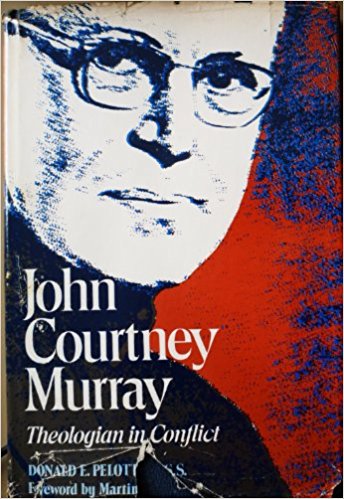 | John Courtney Murray: Theologian in Conflict by Donald E. Pelotte Paulist Press International,U.S.; First Edition edition (January 1, 1976). 222 pages. |
Books on John Courtney Murray
Subscribe to:
Comments (Atom)
